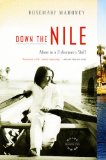Summary | Excerpt | Reviews | Beyond the Book | Readalikes | Genres & Themes | Author Bio

Critics' Opinion:
Readers' Opinion:
First Published:
Jul 2007, 288 pages
Paperback:
Sep 2008, 304 pages
 Book Reviewed by:
Book Reviewed by:
Diane La Rue
Buy This Book
A year passed, and my fantasy failed to fade. I found myself
spending afternoons in my local library, pawing through books
about Egypt and the Nile, studying photographs, gathering information
about the river and about others who had traveled on
it. Millions of people - including thousands of foreigners - had
traveled on the Nile, among them the obvious centuries of Egyptian
fishermen, farmers, and pharaonic slaves who daily went
up and down the river as a matter of survival. Hadrian went up
the Nile. Herodotus did it too. Plato did it. So did Helen of Troy.
Julius Caesar and Cleopatra went up the Nile. So, reportedly,
did Jesus, Mary, and Joseph. Napoleon and his ill-fated soldiers
did it in 1798, and along with them went Dominique-Vivant Denon
and twenty-one mathematicians, three astronomers, seventeen
civil engineers, thirteen naturalists and mining engineers,
thirteen geographers, three gunpowder and saltpeter experts,
four architects, eight draftsmen, ten mechanical draftsmen, one
sculptor, fifteen interpreters, ten writers, and twenty-two printers,
all sent to record and analyze every possible fact about
Egypt, its monuments, its culture, and its people. The result of
their efforts was the Description de L'Egypte, published between
1809 and 1828, an enormous nineteen-volume summary of the
country, complete with highly detailed measurements, etchings,
and drawings. The international publicity and huge number of
maps the Description brought with it eventually inspired the
world's curious to flock to Egypt in droves. (Thanks to Napoleon's
expedition, by 1820 Egypt was the best-mapped country
in the world.) The country that had been lost to the rest of the
world by a thousand years of Arab rule, which had essentially
barred foreign travelers from the Nile Valley, quickly became
the favorite destination of explorers, scientists, tourists, and notables
alike. When Victor Hugo wrote in his preface to Les Orientales
in 1829, "We are all much more concerned with the
Orient than ever before," the statement was directly due to Napoleon's
fact-gathering expedition and the long-locked door it
had opened. Edward Lane, Edward Lear, Lord Byron, William
Makepeace Thackeray, Percy Bysshe Shelley, and William Cullen
Bryant all went to Egypt in the first half of the nineteenth
century. Florence Nightingale went in 1849. So did Gustave
Flaubert. Herman Melville went, as well as kings and queens of
numerous nations, the Prince of Wales, Émile Zola, Winston
Churchill, and William Golding. In the 1950s, three men in
kayaks, John Goddard, Jean Laporte, and Andre Davy, together
paddled nearly the full length of the Nile, from the Kagera River
to Alexandria, and in 2004, a team of explorers led by Pasquale
Scatturo rafted the length of the Blue Nile from its source in
Ethiopia to the Mediterranean Sea.
It has never been the custom, however, for foreign visitors to
operate their own craft on the Egyptian Nile, and in modern
times the government actively discourages such journeys. Tourists opt instead for the cruise ship or, less often, hire an Egyptian
sailor to captain a felucca, the traditional lateen-rigged
sailboat ubiquitous in Egypt. In my first four weeks in Egypt, I
had neither seen nor heard of any foreigners on the river unaccompanied
by an Egyptian captain or of a single woman, Egyptian
or otherwise, operating a boat on the river. Still, I saw no
truly persuasive reason that the trip I had in mind should not
be possible for me. Narragansett Bay was a body of water complicated
by altering tides, sometimes large waves, sudden violent
weather, scores of international shipping tankers powered
by propellers the size of houses, and speedboats occasionally
operated by reckless drunken drivers. In Egypt, though the Nile
did indeed have its own peculiar set of hazards, there would be
none of that. The Egyptian Nile was hardly a wilderness: more
than fifty-five million people lived alongside it; there were no
ferocious animals left there to speak of; and I knew that a desperate
traveler armed with a little bit of money could find her
way off the river, one way or another, at any time.
Copyright © 2007 by Rosemary Mahoney





The Flower Sisters
by Michelle Collins Anderson
From the new Fannie Flagg of the Ozarks, a richly-woven story of family, forgiveness, and reinvention.

The House on Biscayne Bay
by Chanel Cleeton
As death stalks a gothic mansion in Miami, the lives of two women intertwine as the past and present collide.

The Funeral Cryer by Wenyan Lu
Debut novelist Wenyan Lu brings us this witty yet profound story about one woman's midlife reawakening in contemporary rural China.
Your guide toexceptional books
BookBrowse seeks out and recommends the best in contemporary fiction and nonfiction—books that not only engage and entertain but also deepen our understanding of ourselves and the world around us.